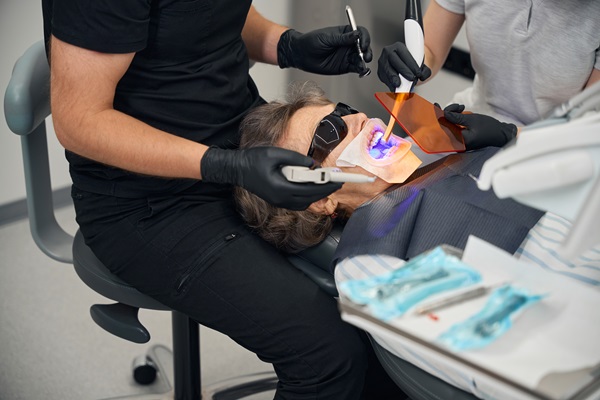Benefits of Implant Supported Dentures

Today, implant supported dentures are all the rave. While some people still opt for standard dentures, a lot of people are going a different route. As a permanent fixture, people no longer have to mess with nighttime soakings and sticky adhesives. People can also smile big without worrying about slippage.
Implant supported dentures — a good idea?
The answer is a resounding yes. Unlike regular dentures a person puts in and takes out, these newly developed dentures remain in place. For this, a dentist inserts titanium screws into the patient’s jawbone. On those, the implants sit. The implants ensure absolute firmness, meaning these will not slip or slide. The dentures also look and feel just like natural teeth.
Key benefits
When compared to standard dentures, the implanted type offers an impressive list of benefits. For one thing, people actually look better. As a permanent part of the mouth, these look completely natural. People then feel more confident when eating, laughing, yawning and smiling. Overall, these dentures enhance a person’s appearance.
One of the more interesting benefits of implant supported dentures is these help improve speech. Considering that regular dentures slide around, a lot of people struggle to pronounce words correctly. In fact, in severe cases, an individual could sound almost intoxicated. Implant supported dentures eliminate all slurring and mumbling.
People who already have implant-supported dentures claim they feel far more comfortable than the old style. When having this procedure done by the right dentist, the dentures will fit exactly the patient. The reason is that an impression of the patient’s mouth goes to a dental laboratory. There, dental professionals customize each set to look and feel great.
Even eating becomes easier, thanks to implant-supported dentures. With standard dentures, it is difficult for someone to bite down firmly. As a result, many people give up some of their favorite foods. Since the implant type functions as normal teeth, this is never an issue. That means people can once again enjoy dining on anything wanted.
There is another fascinating benefit of having implant-supported dentures. The regular type leaves a small gap between the appliance and the gumline. For that reason, it is common for food particles to edge their way underneath. This leads to irritation, tenderness and sometimes, infection. With implants, there is no gap, which eliminates any risk of those things.
Additional advantages
Along with all the benefits mentioned, there are a few additional reasons for choosing implant-supported dentures. Along with improving a person’s self-esteem, the implant dentures help improve oral health. In this case, the dentist does not need to alter the surrounding teeth at all. Instead, the implant remains firmly in place on screws. This makes brushing easier.
Another benefit is the convenience that implant-supported dentures provide. People do not have to take these out to soak at night. They also never have to apply adhesive to make them stick. Instead, an individual has a beautiful set of teeth that remains firmly in place. No slippage or sliding that could cause an embarrassing incident.
Choose implants
If you need dentures, talk to your dentist about implant-supported dentures. If you currently wear traditional dentures, these are still an option. You deserve to feel good when smiling and talking to people. Implant-supported dentures can provide that.
Request an appointment here: https://stunningsmilesoflakeforest.com or call Stunning Smiles of Lake Forest at (949) 258-7433 for an appointment in our Lake Forest office.
Check out what others are saying about our services on Yelp: Read our Yelp reviews.
Related Posts
Seeing an emergency dentistry professional can correct a persistent dental issue. Many people suffer from recurring problems in their teeth or gums. This can lead to regular absences at work or school. Stopping the chronic problem can improve your quality of life.If patients want to know if emergency dentistry can prevent a recurring issue, here…
A preventive dentist is a dental health professional whose services include procedures to protect the teeth and gums from developing problems. This dentist aims to keep your teeth healthy and appealing for the longest possible time.Major dental disorders are avoidable with preventive dental treatment. Preventing future problems and stress from oral health issues early could…
The dental filling has advanced over time. Silver or dental amalgams and tooth-colored fillings (made from composite resin) are two standard options available. It is vital to comprehend their distinctions before deciding on one. You should also consult your dentist about what would be the best filling material for you.Silver amalgam fillings have been popular…
Seeking emergency dentistry treatments can help you get relief. It can also help you regain your normal dental functions and self-esteem. The dentist can share dental care tips that you may not know or have forgotten about. If you want to know more about the dental advice that emergency dentistry can provide, here are the…


